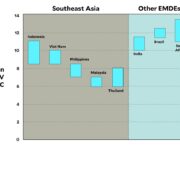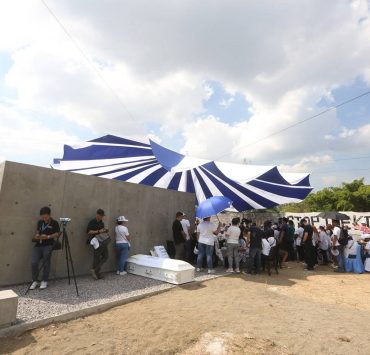This steak was DNA-tested

A few years ago, Jun Sy and his team at PYC Group were on a mission: They wanted to find the best products for the deli they were planning to open. “As an aspiring cook myself, I realized early on that if you have no talent for cooking, you must use the best ingredients,” the company president and founder said.
But it’s not just that, Sy said. “I care about what food I buy and what I feed my family. What we eat affects our health and our family’s health and sometimes we don’t know where it’s coming from. It may have a lot of hormones and antibiotics and a lot of bad stuff that was used that would invariably go into our bodies. One World Deli is all about educating people and creating awareness when it comes to caring about where your food comes from.”So when he heard about Braveheart from a friend in the United States, he was struck by the brand’s story.

“When you start learning a little bit more about the food industry, you’ll find that there’s so much mislabeling or misrepresentation. Braveheart was the only brand I ever met that spoke about this in a very important way … They really cared and they created a system of transparency that I never heard from anybody else. People would just show how nice their farms are. But here, they use DNA tracing. There’s no cheating in the way they do things. It’s not a nice marketing campaign. It is backed up by evidence.”For 15 years now, Braveheart has been making waves in the US with its focus on humane practices, sustainability and commitment to quality. Braveheart works with family farms in the Midwest, making sure they are compensated fairly and that they are meeting their elevated standards.
Happy cow
“A happy cow makes for better meat. How was it raised? What does it eat? Was it raised humanely? We verify every step of the process,” said meat expert Steve Sands, president of protein brands at Performance Food Group and a cattle farmer himself. “Food not only sustains us, but the way food is raised is critical to the planet. Sustainability begins with agriculture. It’s all about doing the right thing and auditing and holding people accountable. The system that we created with Braveheart is now being duplicated.”
Before their PathProven program, when farmers were getting paid per pound and not necessarily for producing good meat, farmers raised bigger and bigger animals, bulking them up with steroids and hormones—things that are not good for both animals and the humans who would be consuming their meat.

“We outlawed many drugs that other companies use,” Sands said.
They show up on the farms twice a year, unannounced, to take soil samples and water samples, check for unapproved drugs and see if the farmers are following Temple Grandin’s animal handling standards. “We were the first company in America to pay farmers to adapt Temple Grandin’s standards. She is the world expert on animal care.”
Each cow is also DNAed, allowing them to offer customers what they call “the highest quality and purest DNA-verified US Black Angus beef.” Sands said, “In every case, we know the farmer, we know what the animal is eating, we know the genetic profile. If you have a tough steak, you can cut off a little piece, send it to the lab, marry it up with a sample and say that this steak came from this animal raised by this person and now let’s look at the feed records and health records. We’ve been doing this for 15 years on every animal.”

True Angus
He added, “We want that best animal, that true Angus. A lot of people don’t realize this but brands can have zero percent Angus and still be labeled Angus. A 51-percent black animal can be labeled Angus. There are a lot of black breeds out there and not all are Angus … It’s a false way to identify Angus. We do it with DNA. This is really Angus and we can prove it.” Naturally, Sy wanted to make Braveheart available at One World Deli. But there was a problem. Braveheart wasn’t selling its meat outside of the US. Undeterred, Sy set out to convince Performance Food Group, the $60-billion company behind Braveheart, to allow them to bring the brand in.
He found an advocate in Sands. Sy said, “When we first told him, ‘We’d like to sell your product,’ it was not a conversation about ‘How much business are you going to give me?’ It was more about ‘Tell me why you’re doing all this.’ One World Deli’s mission resonated with him because it’s very much his own personal passion.”
Sands said, “This is a big step for us. The reason we’re here in the Philippines is Jun. He gives us the confidence to say, let’s see what we can do internationally. We want to be with people we can trust and depend on.”
He calls the Philippines “the most exciting market in Asia.” “We’re committed to bringing unique products to the Philippines that we pioneered in the US.”
Blind taste test
But the story behind Braveheart and its sustainability-focused system is just one thing. “At the end of the day people will care about how good it tastes,” Sy said. “We who love meat, we did a blind taste test across all the brands that were available. We were astounded to find out that almost 100 percent prefer the taste of Braveheart over everything else. So I felt that we had something here that is very special.”
One World Deli has been offering Braveheart ever since it opened its first store in 2021. Today, PYC still remains Braveheart’s only distributor outside of the US. You can find it at One World Deli branches in Jupiter, San Juan and MOA. Other PYC establishments like Butchers also serve Braveheart.
Customers can go to One World Deli to purchase Braveheart for cooking at home or they can ask the chefs to cook it for them there.
The Filipino favorites, of course, are always the rib-eye, tenderloin, porterhouse—all Prime cuts.
But Sy hopes for people to also discover Braveheart’s Choice offerings. “It’s value for money, it’s 15, maybe 20 percent lower than Prime. What we’re trying to hopefully deliver is that quality can be affordable.”
Cheap cuts
Sy walks the talk in his home kitchen. “I like to use the cheap cuts. My favorite is brisket. I enjoy the process of barbecuing a brisket for 10, 12 hours, because that slow cook gives you a product that in the end can beat a rib-eye. I like the journey of preparing a cheaper, lesser-known cut of meat that can be as enjoyable as a very expensive cut.”
Sands, meanwhile, is a rib-eye guy. “I like fat. I think rib-eye has the right blend of tenderness and flavor.”
But, he added, “The thing about meat is it really depends on what you’re doing with it.”
Last week, Sands, members of the media and others guests of PYC got to experience just how One World Deli does meat at a special dinner featuring Braveheart products in San Juan. A couple of days later, customers at One World Deli also got the enjoy the same five-course meal and meet Sands.

Chef Miguel Gianan prepared a delicious succession of beef dishes starting with Carne Asada Street Tacos and One World Deli Signature Sliders. Then it was on to the Pepper-Crusted Corned Beef, Giagan’s take on Irish corned beef.


Giagan says cooking with Braveheart meat is a no-brainer. “The primal cuts, the steak cuts—the rib-eye, the porterhouse, wow, swabe. Then the secondary cuts, like the inside skirt, the beefy flavor is very strong, it’s very macho. You just need a little seasoning, you don’t have to do anything else.”
For the final beef course, Bistecca alla Fiorentina, Gianan said, “I aged it for a few days. It’s cooked on an open pit, wood fire. I used santol.”
The meal ended with The Tattooed Baker Apple Crumble served with Gelato Manila’s Vanilla Bean gelato.
Sands told Lifestyle, “I thought everything was great. I thought it was wonderful. My favorite was corned beef, but the steak was excellent. Everything was awesome.” INQ

















